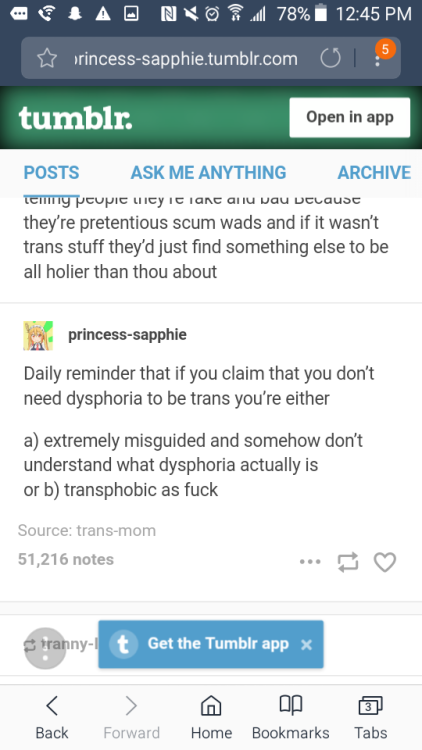terfs-hate-women: trans-mom: Lmao look at the coward who blocks and talks shit. Someone talks like t
terfs-hate-women:trans-mom:Lmao look at the coward who blocks and talks shit. Someone talks like they’ve never been smacked in the mouth before.I’ve said it before, and I’m sure I’ll say it many more times… People who come at an issue from a position that “all X must have Y or they aren’t really X” are just so… fucking… dense.This is logic 101. Literally, take a course in Intro to Logic and Critical Thinking (or check a book on it out from a local library; it’s free) and pay close attention to the part about logical fallacies. This one is known by a few names, but I learned it as The “No True Scotsman” Fallacy.It goes something like this…Person 1: “All Scotsman drink their scotch whiskey neat!” (Neat means no ice, if you’re not familiar with the term.)Person 2: “Well, I’m a Scotsman and I take it with ice.”Person 1: “Then you’re no true Scotsman!”The structure is always the same for this fallacy; someone defines a term with a specific requirement, and then when confronted with a counterexample, they proceed to claim that the example isn’t actually a member of the group, because it doesn’t fit their requirements for inclusion. This is what’s happening with the “all trans people have dysphoria” crowd. Observe. Person 1: “All trans people must experience dysphoria.”Person 2: “But, I’m trans, and I don’t have dysphoria.”Person 1: “Then you’re not really trans!” See? Same exact argument, same logical fallacy. If you believe that all trans people experience dysphoria, and that anyone claiming to be trans without dysphoria is therefore not really trans, then that is true… for your narrow definition of trans. Here’s the thing, though: your definition is not law. Furthermore, your definition is needlessly exclusionary. The trans community clearly includes people who both do and do not experience dysphoria, so a definition that either requires or bars a person from inclusion based on their having or not having dysphoria is inherently a bad definition.How do we know which definition is better, then? Just look at the diatribe of each side. One side is saying, “You must have dysphoria if you are trans.” The other side is saying, “You can have dysphoria if you are trans.” Clearly the first group would be a subset of the second group. If it’s not clear to you, here’s a quick venn diagram to illustrate. All members of the “must have dysphoria” group are inherently also members of the “can have dysphoria” group, so it makes sense to use a definition that includes the whole, and come up with a subdefinition for the other group. Maybe something like dystrans, short for dysphoric transgender? I don’t know, and I really don’t have a horse in that race. The point is simply that it’s silly and illogical to be in the subgroup and demand that the parent group adopt your unnecessarily narrow definition.Thanks for coming to (what was originally supposed to be a short clarification but ended up becoming) my Ted Talk. -- source link
Tumblr Blog : trans-mom.tumblr.com
#dysphoria#transphobia#not positivity#gatekeeping tw

